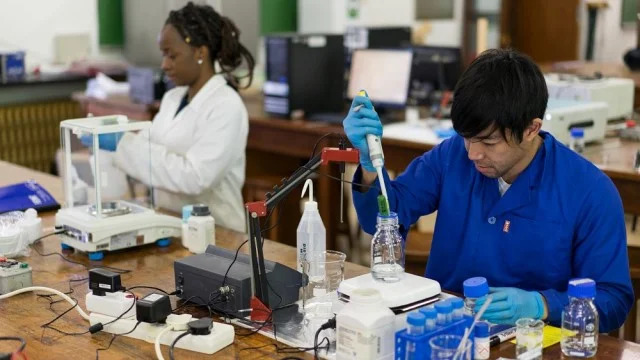By KARABO DIKOBE
Rhodes University, home to the oldest biotechnology academic programme in South Africa, boasts no less than seven graduate distinctions from the Biotechnology Innovation Centre this past October.
For a small department, the Rhodes University Biotechnology Innovation Centre’s (RUBIC) recent October graduation was cause for celebration. Nine postgraduate students received degrees, including one PhD and eight Masters students. Of the eight Masters students, a staggering seven received the degree with a distinction.
Launched at the University twenty-three years ago, biotechnology was later formally established as a separate discipline within the Department of Biochemistry, Microbiology and Biotechnology (BMB Department). Established in 2014, RUBIC is the brand-new academic home of the discipline of Biotechnology, providing a trans-disciplinary research and learning environment in the field.
Prof Janice Limson, SARChI Chair in Biotechnology Innovation & Engagement and Director of RUBIC, who supervised or co-supervised five of the MSc students and one PhD with Dr Ronen Fogel of RUBIC, noted: “It is a rare achievement to receive a Masters with distinction. To have seven from our department graduate with distinction is phenomenal.” This is because the examination process is quite rigorous, involving a thorough examination by two separate and independent leaders in the field from across the world.

Funded either directly or indirectly through the SARChI Chair in Biotechnology Innovation & Engagement, seven of these students’ projects were all directly linked to new products and processes that have the potential to impact society positively.
Dupe Ojo and Bianca Taylor worked on developing new diagnostic tests for monitoring human health. Molopo Lipali, Trisha Mpofu, Galad Smith and Siphumze Bani all worked on novel approaches to wastewater treatment. Both Mpofu and Bani directly engaged communities as part of their research, with Mpofu’s work representing a key milestone in trans-disciplinary research and how scientists can engage communities as part of their research. Dr Fogel proudly noted that “the students beat the odds, completing their degrees despite being away from the usual support of their on-campus peers and supervisors”.
Mpofu explained that the most challenging part was completing her thesis, having started a new job during the writing process. “I struggled to prioritise my thesis […] and to remain committed and disciplined about finishing it. Discipline and consistency are the most important things I believe for this particular journey,” she said.
She advises anyone thinking of completing an MSc to find something they are passionate about and research widely. “It is most important to read and write and write and edit and write and continue to write. Don’t give up!” she said.
It is also important to realise that different people struggle with different things. As with Lipali, “Personally, it [the hardest part of getting their Masters]was the struggle of seeing the relevancy of my work regarding what significant thing, in my opinion, will contribute into its niche field. I remember constantly questioning the aims and motives for doing everything I’m doing until the last moments of submission.”
Lipali later realised later on that it’s the journey that is important. As a person who now cannot settle for mediocrity, they welcome the growth this journey has afforded them. Submitting their thesis was a huge moment of relief, a sense of freedom, Lipali explained, who realised that immense opportunities come from achievement. “If you are ready to be taught to enjoy the journey and not the destination, then do your MSc. You will constantly question everything – your mental, emotional, and for some people, your spiritual endurance will be tested,” Lipali said.
“Be mindful of the challenges and changes you go through during this period to help you garner love and develop a passion for what you are doing. Also, remember that you are not alone in this journey. You have your supervisors, your strengths, and your desire to learn guiding you through,” they stated.
Source: Rhodes University Communications



